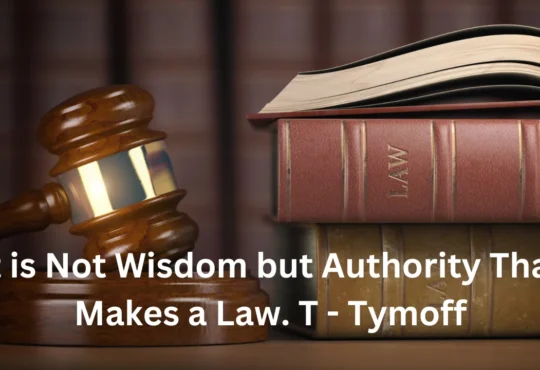It is not wisdom but authority that makes a law. t – tymoff Unlocking the mysteries of lawmaking requires us to delve into the realms of and authority. But what indeed lies at the heart of creating laws that govern our society? Is itprofound understanding and discernment? Or is it authority, wielding power and control? This thought-provoking blog post will explore the age-old question: “Is it not but authority that makes a law?” Join us as we embark on a journey to unravel the intricate relationship between these two concepts and uncover their role in shaping our legal systems. So fasten your seatbelts as we navigate through this intellectual labyrinth!
What is wisdom?
Wisdom, often associated with deep insight and sagacity, encompasses more than mere knowledge or intelligence. It goes beyond accumulating facts and data; it is the ability to apply that knowledge meaningfully and discerningly. Wisdom involves making sound judgments based on experience, intuition, and thoughtful reflection.
It is not something that can be acquired overnight or from textbooks alone. emerges from life experiences, personal growth, and lessons from successes and failures. It requires an open mind willing to explore different perspectives and consider diverse viewpoints.It is not wisdom but authority that makes a law. t – tymoff
Wisdom is about understanding the complexities of human nature and society. It involves recognizing patterns, anticipating consequences, and appreciating the interconnectedness of various factors. Wise individuals possess emotional intelligence and intellectual prowess – they empathize with others’ struggles while maintaining clarity in their decision-making processes.
Wisdom allows one to navigate through life’s challenges with grace and integrity. It guides us towards making choices that are beneficial for ourselves and the greater good of society. In the realm of lawmaking specifically, wisdom plays an essential role in crafting legislation that reflects nuanced understanding rather than knee-jerk reactions or personal biases.
So, let us continue exploring this intricate dance between wisdom and authority as we seek to uncover how these two forces shape our laws!
What is authority?
Authority refers to the power or right to give orders, make decisions, and enforce obedience. It is often associated with individuals or institutions granted legitimate control over a specific domain. Authority can be derived from various sources, such as legal frameworks, social norms, expertise, or hierarchical structures.
In the context of lawmaking, authority plays a crucial role. Lawmakers are entrusted with creating and enforcing laws that govern society. Their power stems from their position within the legislative system and ability to represent the interests of the people they serve.
However, it is essential to note that authority alone does not guarantee wisdom in lawmaking. While lawmakers may possess legal expertise and an understanding of societal needs, actual knowledge comes from a more profound comprehension of justice, fairness, and ethical considerations.
Wisdom encompasses a broader perspective that goes beyond mere technical knowledge. It involves critical thinking skills, empathy for diverse views, foresight into potential consequences of laws enacted, and an awareness of historical contexts.
Therefore, while authority legitimizes lawmakers’ actions and decisions regarding the legislation creation process, it is ultimately wisdom – gained through experience and reflection – that enables them to craft effective laws that serve society’s best interests.
The difference between wisdom and authority
Wisdom and authority are distinct concepts that play different roles in various aspects of life. Wisdom is the ability to make sound judgments based on knowledge and experience. It is the application of deep understanding and practical insights to solve problems or guide decision-making processes. On the other hand, authority implies having power or control over others, often granted by a position or role in society.
While wisdom comes from within an individual, authority is bestowed upon them by external forces such as laws, regulations, or social structures. Wisdom is subjective and can differ from person to person, influenced by personal beliefs and values. Authority, however, tends to be more objective and universally recognized.
Concerning lawmaking, wisdom may inform the creation of laws through thoughtful consideration of societal needs and potential consequences. It involves drawing on collective experiences and expertise to develop legislation that promotes justice and fairness.
Authority in lawmaking stems from the legal framework established within a society. It relies on designated individuals or institutions who have been given the power to enact laws for the greater good of society as a whole.
While wisdom and authority contribute to effective lawmaking, they serve different purposes. Understanding brings depth of insight, while management ensures compliance with established norms.
In conclusion,
The distinction between wisdom
and authority is essential
to understand their respective roles
in lawmaking.
By acknowledging their differences,
We can appreciate how they complement each other
and contribute towards creating just societies.
Ultimately,
It takes a balance between wise judgment
and authoritative implementation
to establish effective laws
that benefits everyone involved
How does this relate to lawmaking?
Lawmaking is a complex process involving creating and enforcing rules to govern society. It requires careful consideration of various factors, including wisdom and authority. While some argue that wisdom should drive lawmaking, it is only sometimes the case.
Wisdom can be defined as having knowledge, experience, and good judgment. In lawmaking, learning would mean making decisions based on a deep understanding of societal needs and values. However, relying solely on wisdom could lead to subjective interpretations and biases.
On the other hand, authority refers to the power or right to give orders or make decisions. Regarding lawmaking, management is crucial in ensuring that citizens implement and follow laws effectively. Without power, laws would lack legitimacy and enforcement mechanisms.
The relationship between wisdom and authority in lawmaking is complex. While wisdom can inform decision-making processes by providing insights into what is just and fair, ultimate authority lies with those entrusted with creating laws – lawmakers themselves.
To make effective laws, policymakers need both wisdom and authority. They must consider diverse perspectives and legal principles, such as equality before the law and protection of individual rights. By striking a balance between these elements – drawing from both wise counsel and authoritative decision-making – lawmakers can create fairer regulations that better serve society.
The difference between wisdom and authority
Wisdom and authority are two distinct concepts that play different roles in decision-making. Wisdom refers to the knowledge, experience, and insight gained over time. It is the ability to make informed judgments based on understanding and reflection. On the other hand, authority relates to power or control granted by a position or status.
While wisdom derives from personal growth and learning, authority comes from external sources such as laws, regulations, or hierarchical positions. Wisdom is subjective; it varies from person to person based on their unique experiences and perspectives. In contrast, authority is objective; it holds legitimacy conferred by society or governing bodies.
The difference between wisdom and authority becomes apparent when considering lawmaking processes. Laws should be guided by both wisdom and authority for effective governance. Combining the insights of wise individuals with the power bestowed upon them can lead to fairer decisions that benefit society as a whole.
However, suppose an individual possesses only wisdom without any legitimate authority behind them. In that case, their opinions may carry less weight in shaping laws than those who hold influential positions within governmental structures.
While wisdom provides valuable insights for decision-making processes in lawmaking contexts, authoritative figures possess the necessary power to enforce those decisions effectively. Both elements are crucial in creating just and functional legal systems that serve societies’ best interests.
How to make laws
Making laws is a complex process that requires careful consideration and collaboration among various stakeholders. Here are some critical steps involved in the lawmaking process:
1. Identifying the need: The first step in making laws is identifying a problem or issue requiring legislative intervention. This could be anything from addressing social inequalities to ensuring public safety.
2. Research and consultation: Once a new law has been identified, extensive research and consultation must be conducted to gather relevant information and insights. This involves consulting with experts, conducting studies, and seeking input from affected individuals or communities.
3. Drafting the legislation: Lawmakers draft the legislation based on the research findings and consultations. This involves carefully crafting legal language that addresses the identified problem while considering its potential impact on different stakeholders.
4. Review and amendment: Before a proposed law can become official, it undergoes thorough review by relevant committees or bodies within the legislative system. Modifications may be suggested based on feedback received during this stage.
5.
Voting and implementation: Once reviewed, legislators vote whether to pass or reject the proposed law. If approved, it moves forward for further implementation procedures such as enforcement mechanisms, regulations development, etc.
6.
Evaluation and revision: After a law comes into effect, regular evaluation should occur to assess its effectiveness in achieving its intended goals. Appropriate amendments are made accordingly if necessary modifications are identified through this evaluation process.
The above steps provide an overview of how laws are created.
This process must be transparent, inclusive, and responsive to societal needs to ensure effective governance.
Wisdom can undoubtedly influence these decisions, but ultimately, authority- the power vested in elected representatives- allows laws to come into existence.
Conclusion
Conclusion
Wisdom and authority play distinct roles in the making of laws. While learning refers to individuals’ knowledge, experience, and sound judgment, authority represents the power or right to enforce laws. Although both elements have their merits, authority ultimately carries more weight in shaping legislation.
Wisdom alone cannot guarantee effective lawmaking as it may vary from person to person and can be subjective. On the other hand, the authority provides a standardized framework within which laws are created and implemented to benefit society.
While wisdom certainly plays a role in informing decisions made by those in positions of authority, it is not solely reliant on individual wisdom but rather on collective input from experts across various fields. This collaborative approach ensures laws are based on informed perspectives rather than personal biases or limited understanding.
To make effective laws, policymakers must consider both wisdom and authority. They must seek knowledgeable advisors who possess expertise in relevant areas while recognizing the importance of established legal frameworks and institutions.
Striking a balance between wisdom and authority allows for fair and just governance. By drawing upon diverse sources of knowledge while respecting established power systems, lawmakers can create legislation that reflects societal needs while upholding fundamental principles such as justice and equality.
So remember: It is not solely wisdom but also authoritative decision-making processes that contribute to creating impactful laws that shape our societies for future generations.






